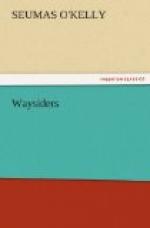“And so she is the last?” he said, eyeing the tin can.
“She is the Can with the Diamond Notch.”
“Odds and ends go cheap,” said Festus Clasby.
“She is the last, but the flower of the flock.”
“Remnants must go as bargains or else remain as remnants.”
“My wallet!” protested Mac-an-Ward, “you wound me. Don’t speak as if I picked it off a scrap heap.”
“I will not, but I will say that, being a tail end and an odd one, it must go at a sacrifice.”
The Son of the Bard tapped the side of the can gently with his knuckles.
“Listen to him, the hard man from the country! He has no regard for my feelings. I had the soldering iron in my hand in face of it before the larks stirred this morning. I had my back to the East, but through the bottom of that can there I saw the sun rise in its glory. The brightness of it is as the harvest moon.”
“I don’t want it for its brightness.”
“Dear heart, listen to the man who would not have brightness. He would pluck the light from the moon, quench the heat in the heart of the sun. He would draw a screen across the aurora borealis and paint out the rainbow with lamp black. He might do such things, but he cannot deny the brightness of this can. Look upon it! When the world is coming to an end it will shine up at the sky and it will say: ’Ah, where are all the great stars now that made a boast of their brightness?’ And there will be no star left to answer. They will all be dead things in the heaven, buried in the forgotten graves of the skies.”
“Don’t mind the skies. Let me see if there may not be a leakage in it.” Festus Clasby held up the can between his handsome face and the bright sky.
“Leakages!” exclaimed Mac-an-Ward. “A leakage in a can that I soldered as if with my own heart’s blood. Holy Kilcock, what a mind has this man from the country! He sees no value in its brightness; now he will tell me that there is no virtue in its music.”
“I like music,” said Festus Clasby. “No fiddler has ever stood at my door but had the good word to say of me. Not one of them could ever say that he went thirsty from my counter.”
Said the Son of the Bard: “Fiddlers, what are fiddlers? What sound have they like the music of the sweet milk going into that can from the yellow teats of the red cow? Morning and evening there will be a hymn played upon it in the haggard. Was not the finest song ever made called Cailin deas cruidhte na mbo? Music! Do you think that the water in the holy well will not improve in its sparkle to have such a can as this dipped into it? It will be welcome everywhere for its clearness and its cleanness. Heavenly Father, look at the manner in which I rounded the edge of that can with the clippers! Cut clean and clever, soldered at the dawn of day, the dew falling upon the hands that moulded it, the parings scattered about my feet like jewels. And now you would bargain over it. I will not sell it to you at all. I will put it in a holy shrine.”




